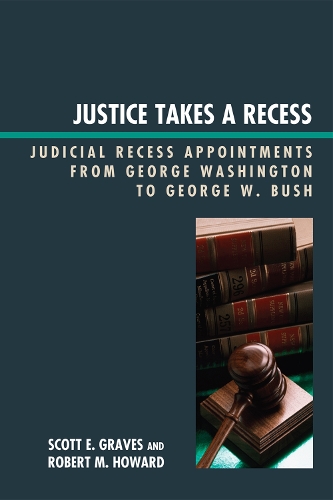
Justice Takes a Recess: Judicial Recess Appointments from George Washington to George W. Bush
(Paperback)
Publishing Details
Justice Takes a Recess: Judicial Recess Appointments from George Washington to George W. Bush
By (Author) Scott E. Graves
By (author) Robert M. Howard
Bloomsbury Publishing PLC
Lexington Books
20th September 2010
United States
Classifications
Professional and Scholarly
Non Fiction
347.7314
Physical Properties
Paperback
126
Width 154mm, Height 231mm, Spine 9mm
195g
Description
The Constitution allows the president to fill up all Vacancies that may happen during the Recess of the Senate, by granting Commissions which shall expire at the End of their next Session. In Justice Takes a Recess, Scott E. Graves and Robert M. Howard address how presidents have used recess appointments over time and whether the independence of judicial recess appointees is compromised. They argue that these appointments can upset the separation of powers envisioned by the Framers, shifting power away from one branch of government and toward another.
Examining every judicial recess appointment from 1789 to 2005, the authors discover that presidents are conditionally strategic when they unilaterally appoint federal judges during Senate recesses. Such appointments were made cautiously for most of the twentieth century, leading to a virtual moratorium for several decades, until three recent recess appointments to the courts in the face of Senate obstruction revived the controversy. These appointments suggest the beginning of a more assertive use of recess appointments in the increasingly politicized activity of staffing the federal courts. The authors argue that the recess appointment clause, as it pertains to the judiciary, is no longer necessary or desirable. The strategic use of such appointments by strong presidents to shift judicial ideology, combined with the lack of independence exhibited by judicial recess appointments, results in recess power that threatens constitutional features of the judicial branch.
Reviews
In this first-rate study of recess appointments, Graves and Howard rigorously examine the use and implication of temporary appointments to the bench. Their analysis provides the first empirical demonstration that the job security ensured by Article III is indeed essential for ensuring judicial independence. This book should be essential reading for those who care about the judiciary and the health of our constitutional system. -- Forrest Maltzman, George Washington University
Despite all the recent attention to judicial selection, recess appointments remained under the radar screenuntil now. Justice Takes a Recess is not only a masterful treatment of this understudied topic, but also an excellent example of how to employ sophisticated social science data and methods to develop important policy implications. -- Lee Epstein, Northwestern University School of Law
Graves and Howard provide an important contribution to the growing scholarship in the judicial appointments area. * Law and Politics Book Review *
Leveraging impressive data and sophisticated methods, the authors rigorously address the interesting phenomenon of recess appointments to the federal courts. Anyone who cares about judicial appointments, the independence of the judicial branch, or the separation of powers in general will find this an important book. -- Tom Hansford, University of California, Merced
Author Bio
Scott E. Graves is assistant professor of political science at Georgia State University.
Robert M. Howard is professor of political science at Georgia State University.
